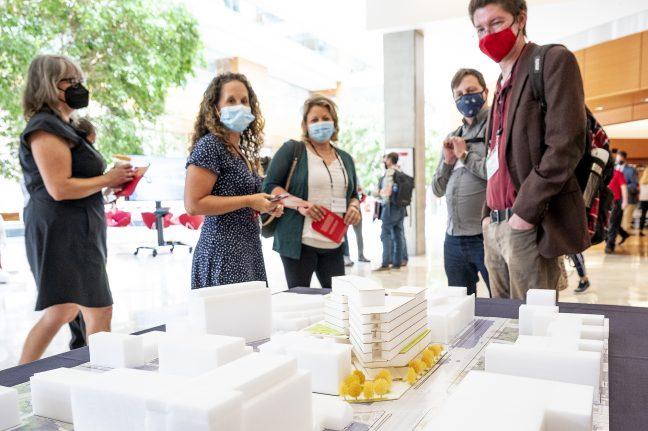The University of Wisconsin announced plans to construct a $225 million building for the School of Computer, Data and Information Sciences at the launch event Sept. 17.
UW has gathered $175 million so far and will raise $50 million more for the project. The 300,000-square-feet building will be the most sustainable building on campus, according to the Milwaukee Journal Sentinel.
UW alumni John and Tashia Morgridge donated $125 million to the project as a way to give back to the university, including $50 million through a one-to-one match. The remaining $50 million will come from the Wisconsin Alumni Research Foundation.
The Morgridges’ mission focuses on investing in organizations that reimagine solutions to some of today’s most significant challenges.
“This investment, and the CDIS building and the departments it will inspire, is part of our repayment to the people of this state for our education,” John said. “We, like our parents, have long believed that education is one of the very best investments in a future world.”
In a statement to The Badger Herald, Morgridge Family Donors Representative George Austin said the Morgridge family has supported UW in many ways over the years.
Austin said the Morgridges’ investment will hopefully motivate other donors to chip in to the project.
“[This investment] will help secure the university’s place in being a global innovator in the study of computer science and data,” Austin said. “These individual schools that make up the CDIS department will all contribute to another leadership role for UW in computing, statistics and information sciences.”
The School of Computer, Data and Information Sciences will bring an entirely new collaboration of study to UW, combining the Computer Sciences and Statistics Department with the Information School, according to a UW press release.
CDIS will focus on societal questions regarding technological advancement by merging several highly-ranked departments. Analyzing the impacts of social media, interaction of people with data and 3D imaging are just some of the areas CDIS hopes to explore.
In an email statement to The Badger Herald, academic Associate Dean for Computer, Data and Information Sciences Kristin Eschenfelder said the new building will impact new and developing majors.
“[The building] extends UW-Madison’s long-standing excellent computer science and statistics programs by fostering new programs and activities that combine questions and perspectives from the humanities and social sciences with the excellence in computing, data science and statistics,” Eschenfelder said.
There are currently 3,600 undergraduate and graduate students majoring in a variety of CDIS disciplines. The field has grown immensely over the past decade from 200 students to 2,000 students. Over 40% of these students are doubling or tripling majors.
CDIS will help develop a legacy at UW as many of the fields of study offered at CDIS are new areas that have not been explored yet.
“The building will serve multiple majors and graduate programs. Some of those majors exist now and some are in development,” Eschenfelder said. “We have several innovative new majors in the proposal stage that have a strong social impact but also get students expertise in computing and data.”
Eschenfelder said this new addition to UW will benefit and transform CDIS in a variety of ways. She wrote she hopes the school becomes the foundation of a inclusive and welcoming community at UW that will attract a broad range of students from different backgrounds. She said the goal is to provide a space for students of many interests to get involved with computing or data-related coursework, clubs and activities.
“We want to foster a community, where students use computing technology and data to improve their communities and make positive changes in the world,” Eschenfelder said.
CDIS also hopes to raise an additional $100 million for academic support.
The school plans to double its faculty to meet current and anticipated demand, aiming to attract top-notch talent across the nation with the novel prospects of the fledgling department.
“This will help fund student success through augmenting the student experience, industry partnerships, research opportunities and cross-discipline initiatives between our departments and our colleagues in engineering, business and medicine,” the department said.


